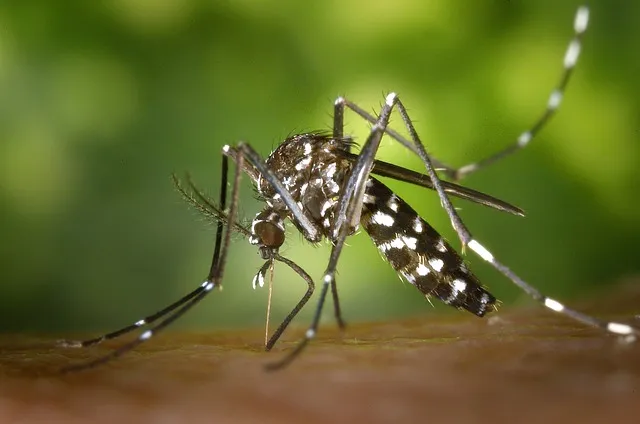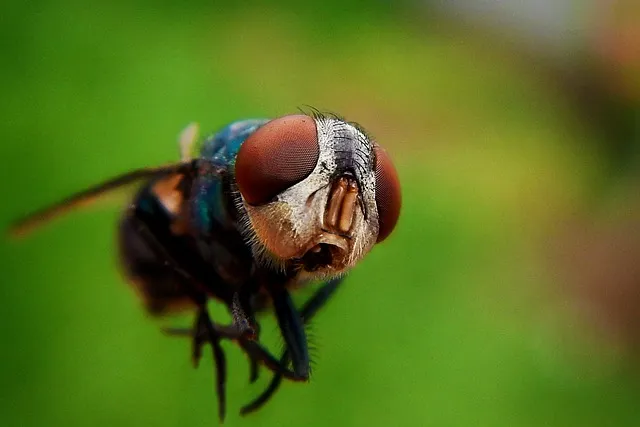Sustainable mosquito control practices prioritize eco-friendly alternatives to traditional chemical methods, focusing on natural solutions and biological controls. By leveraging plant repellents, promoting proper waste management, and introducing beneficial insects like dragonflies, communities can effectively manage mosquito populations while minimizing environmental harm. This shift away from synthetic pesticides aims to protect non-target organisms, preserve ecosystems, and ensure safer human and wildlife interactions, ultimately fostering a healthier balance within the environment.
“Unraveling the puzzle of eco-friendly mosquito control is essential for a healthier, more sustainable environment. Traditional methods, often relying on toxic chemicals, pose significant risks to ecosystems and human health. This article explores eight powerful yet sustainable strategies to combat mosquitoes. From understanding their behavior and leveraging natural predators to planting pest-repelling herbs and effective water management techniques, we delve into holistic solutions. Discover the benefits of these eco-conscious approaches and empower communities to collaborate for lasting mosquito control.”
# Eco-Friendly Mosquito Control: Eight Sustainable Strategies

Eco-friendly mosquito control approaches are gaining traction as communities seek sustainable solutions to manage these pesky insects without harmful chemicals. Instead of relying on traditional, chemical-based methods, which can have detrimental effects on the environment and human health, there are numerous natural and organic strategies that prove effective in reducing mosquito populations. These methods not only help create a healthier outdoor environment but also contribute to the overall preservation of ecosystems.
Implementing these eco-friendly tactics involves utilizing plants known for their natural repellency, such as citronella and lavender, setting up physical barriers like screens and nets, promoting proper waste management to eliminate standing water where mosquitoes breed, and adopting integrated pest management (IPM) techniques that focus on the complete life cycle of mosquitoes. Additionally, introducing beneficial insects like dragonflies and damselflies, which feed on mosquitoes, and using biological agents such as Bacillus thuringiensis israelensis (Bti), a bacteria that targets mosquito larvae, are further examples of sustainable mosquito control practices.
<section id="the-impact-of-traditional-mosquito-control-methods“>
The Impact of Traditional Mosquito Control Methods

Traditional mosquito control methods, while effective in the short term, come with significant environmental and health concerns. The widespread use of synthetic pesticides and chemical treatments can lead to ecological imbalance by harming non-target organisms, including beneficial insects and aquatic life. These chemicals often persist in the environment, contaminating water sources and soil, which can have long-lasting detrimental effects on local ecosystems.
Moreover, resistance to conventional insecticides is on the rise, rendering these methods less efficient over time. The constant exposure to these chemicals also raises health risks for humans and domestic animals, especially when used in residential areas. Eco-friendly alternatives, focusing on biological control, habitat manipulation, and non-toxic repellents, offer a more sustainable approach to mosquito management, mitigating the adverse impacts associated with traditional Mosquito Control practices.
– Discuss the environmental and health concerns associated with conventional pest control chemicals.

Conventional mosquito control methods often rely on synthetic pesticides, which can have significant environmental and health implications. These chemicals, while effective in killing mosquitoes, can also harm non-target organisms, including beneficial insects, birds, fish, and even mammals. Exposure to these toxic substances may lead to water pollution, as they often run off into nearby bodies of water, affecting aquatic ecosystems. Additionally, some pesticides have been linked to various health issues in humans, ranging from skin irritations to more severe long-term effects, making alternative methods of mosquito control increasingly desirable.
By opting for eco-friendly Mosquito Control solutions, we can mitigate these risks and promote a healthier environment. Natural alternatives, such as biological controls (introducing mosquito predators), plant-based repellents, and environmental modifications, offer safer and more sustainable options. These methods not only reduce the potential harm to wildlife and human health but also contribute to maintaining a balanced ecosystem, ensuring long-term effectiveness in mosquito management without causing further ecological damage.
<section id="benefits-of-eco-friendly-alternatives“>
Benefits of Eco-Friendly Alternatives

The shift towards eco-friendly mosquito control methods offers a multitude of benefits, both for the environment and human health. Traditional chemical sprays can have detrimental effects on local ecosystems, harming beneficial insects like bees and butterflies, as well as water bodies where they are applied. In contrast, natural alternatives such as plant-based repellents, biological controls, and habitat manipulation provide a safer and more sustainable approach to mosquito management.
By adopting eco-friendly practices, communities can reduce the risk of chemical runoff into rivers and lakes, preserving aquatic biodiversity. Additionally, these methods promote a healthier balance in local ecosystems by supporting natural predators of mosquitoes, such as birds, fish, and insects like dragonflies. This holistic approach to mosquito control not only minimizes environmental impact but also fosters a more resilient and harmonious coexistence with these pesky insects.
– Explore the advantages of natural, non-toxic methods for mosquito management.

Natural, non-toxic methods for mosquito control offer a multitude of advantages over traditional chemical-based solutions. These eco-friendly approaches prioritize the preservation of biodiversity and the health of ecosystems by avoiding harmful pesticides that can contaminate water bodies and disrupt beneficial insect populations. By leveraging the power of nature, such methods not only reduce environmental impact but also promote human and pet safety, making them ideal for residential, commercial, and public spaces.
One of the key benefits of eco-friendly mosquito control is its ability to target specific pests while minimizing collateral damage. Natural repellents like citronella, lavender, and peppermint oils can deter mosquitoes effectively without affecting other insects that play crucial roles in ecosystem balance. Additionally, biological controls such as releasing beneficial insects (e.g., dragonflies, damselflies) or using parasitic wasps can help regulate mosquito populations over time, providing a sustainable and long-lasting solution to Mosquito Control challenges.
<section id="understanding-mosquito-behavior“>
Understanding Mosquito Behavior

Mosquitoes, though tiny, are complex creatures with distinct behaviors that play a significant role in their reproductive cycles and feeding patterns. Understanding these habits is crucial for effective Mosquito Control strategies. They are highly attracted to carbon dioxide, heat, and certain chemicals present in human sweat, making them frequent visitors to outdoor spaces where people gather. This knowledge allows for the strategic placement of mosquito traps and repellents in areas where humans are likely to be active.
Moreover, mosquitoes breed in stagnant water, so eliminating these breeding grounds is a key aspect of Mosquito Control. By removing standing water from containers and maintaining proper drainage, we can significantly reduce mosquito populations. This behavioral understanding not only aids in the development of targeted control methods but also encourages environmentally friendly practices that minimize the impact on non-target species and ecosystems.
– Delve into the habitat preferences and feeding patterns of mosquitoes to identify effective, targeted control strategies.

Understanding mosquito behavior is key in implementing eco-friendly mosquito control methods. These insects are highly adapted to their environments, with distinct habitat preferences and feeding patterns that vary among species. For instance, many mosquitoes breed in stagnant water, making source reduction a powerful tool for control—removing or treating standing water where they lay their eggs. During their adult stage, mosquitoes actively seek blood meals from both humans and animals, often showing a preference for certain carbon dioxide levels and body heat. Targeting these behaviors with strategic measures like using natural repellents, promoting better hygiene, and implementing ultra-low volume (ULV) spraying can significantly reduce mosquito populations while minimizing environmental impact.
By considering the specific habitat and feeding behaviors of different mosquito species, control strategies can be tailored for maximum effectiveness and minimal ecological disruption. This targeted approach ensures that efforts are focused on where and when mosquitoes are most active, thereby enhancing the overall success of Mosquito Control initiatives and promoting a healthier balance between humans, animals, and their ecosystems.
<section id="planting-for-pest-repellency“>
Planting for Pest Repellency

In the quest for effective yet eco-friendly mosquito control, nature offers a wealth of solutions through strategic planting. Certain plants have natural properties that act as powerful repellents against mosquitoes. For instance, citronella grass, with its distinctive aroma, is renowned for deterring these pests. Similarly, lavender, lemongrass, and marigolds are known to create an environment inhospitable to mosquitoes due to their strong scents.
Incorporating these plants into your garden or outdoor spaces not only contributes to a more sustainable approach to mosquito control but also adds aesthetic value. By choosing native plant varieties that attract beneficial insects while repelling mosquitoes, you can foster a balanced ecosystem. This holistic method ensures that the environment remains healthy and pest-free without resorting to harmful chemicals, thereby promoting overall well-being.
